新概念英语第一册103-104课件(共58张PPT)
文档属性
| 名称 | 新概念英语第一册103-104课件(共58张PPT) | 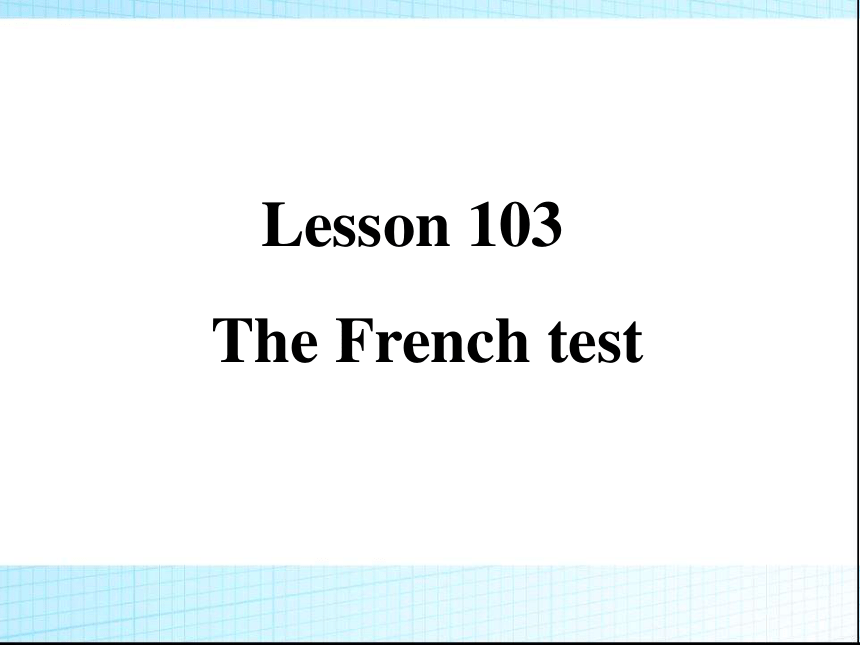 | |
| 格式 | ppt | ||
| 文件大小 | 2.3MB | ||
| 资源类型 | 教案 | ||
| 版本资源 | 新概念英语 | ||
| 科目 | 英语 | ||
| 更新时间 | 2024-03-08 08:07:03 | ||
图片预览

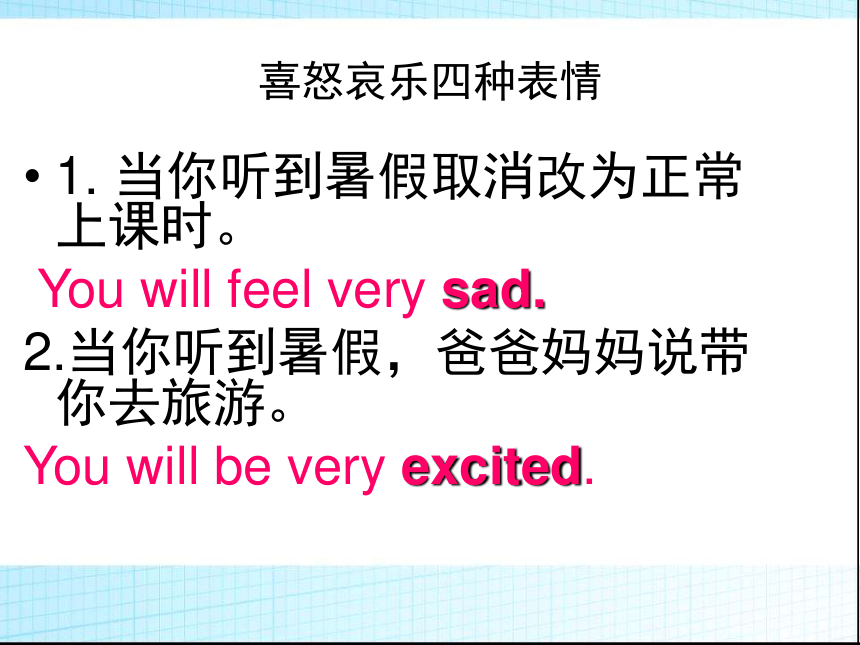
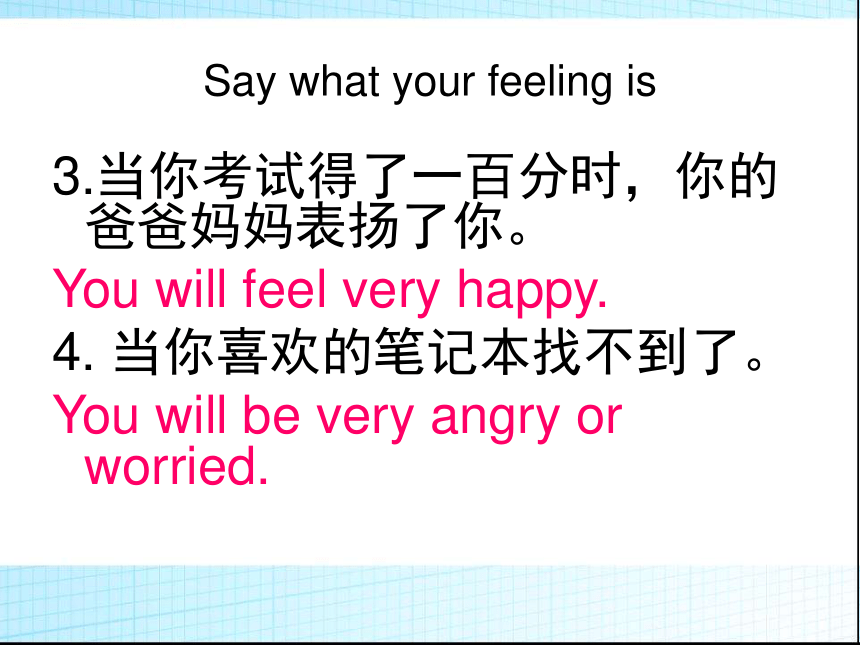
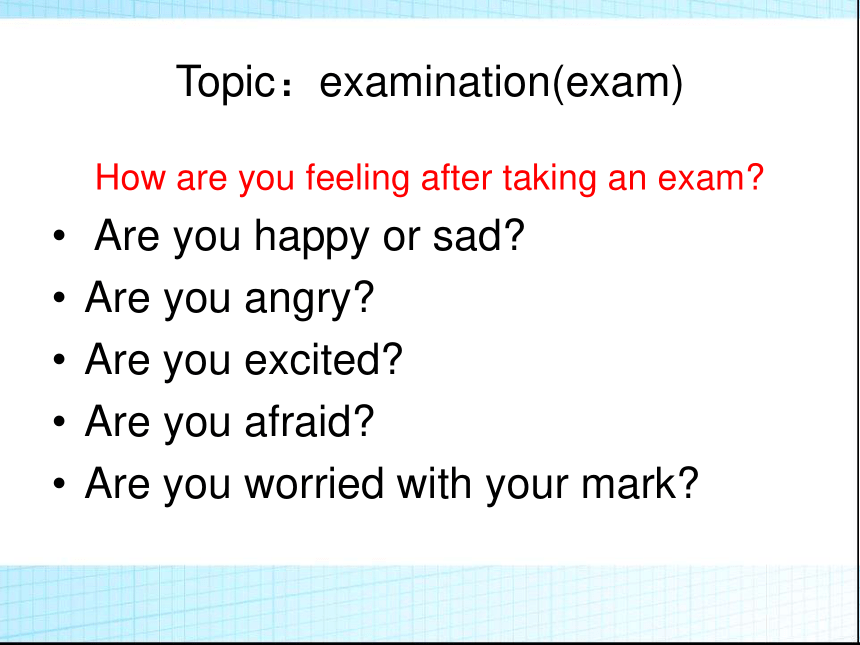
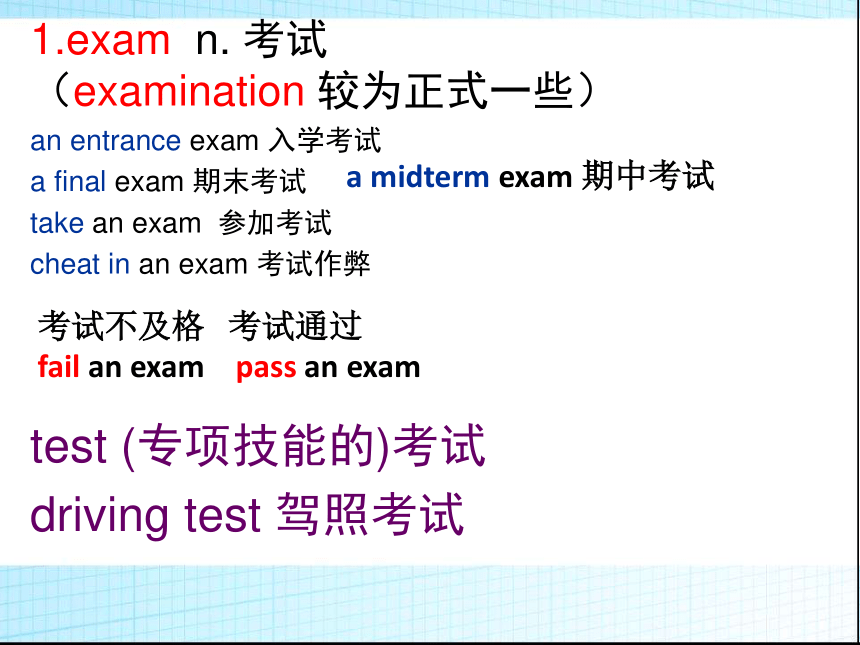
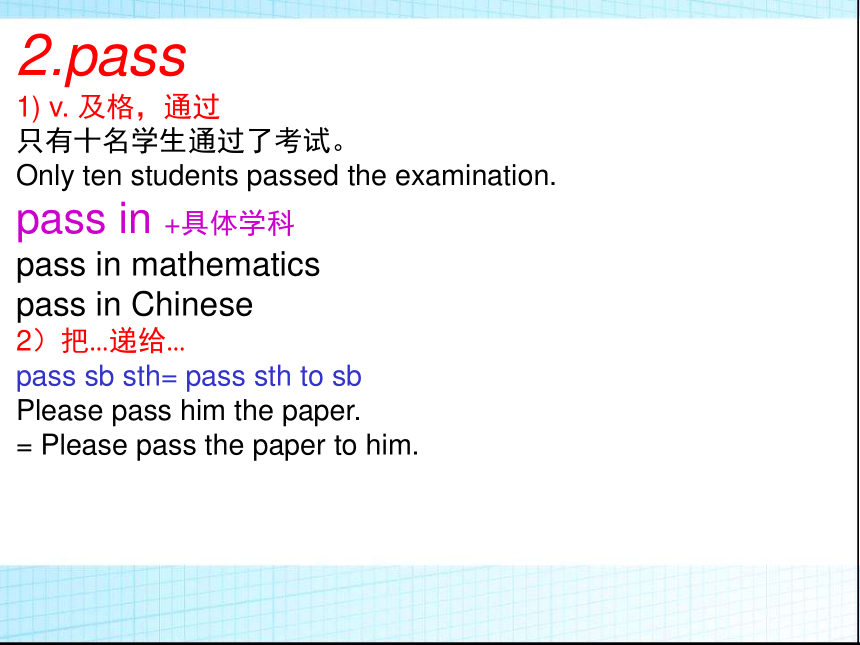
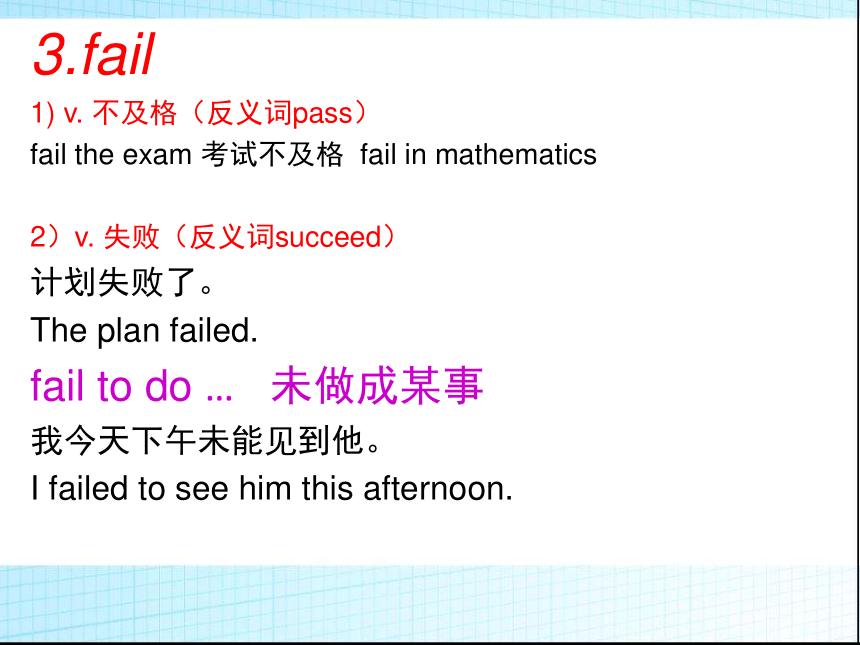
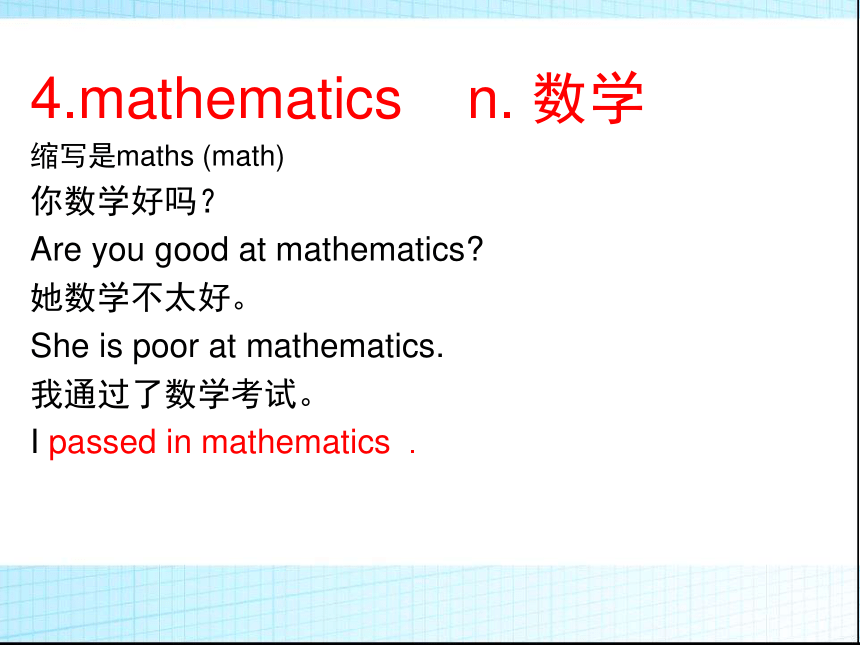
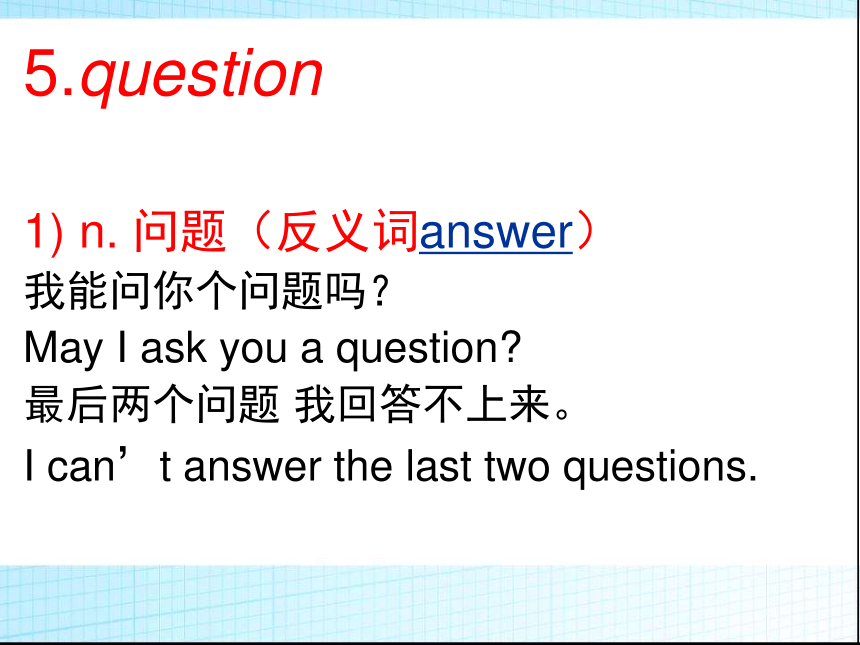
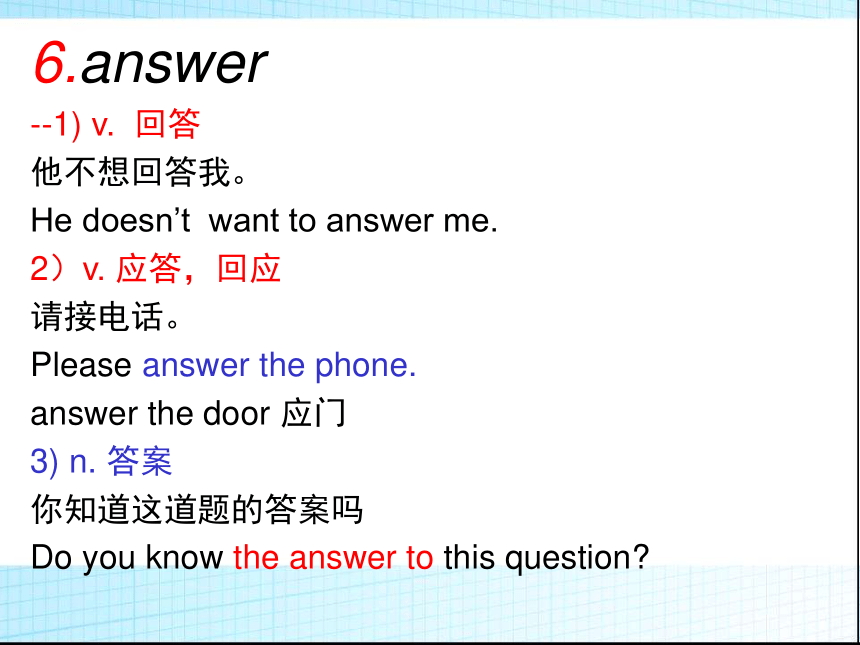
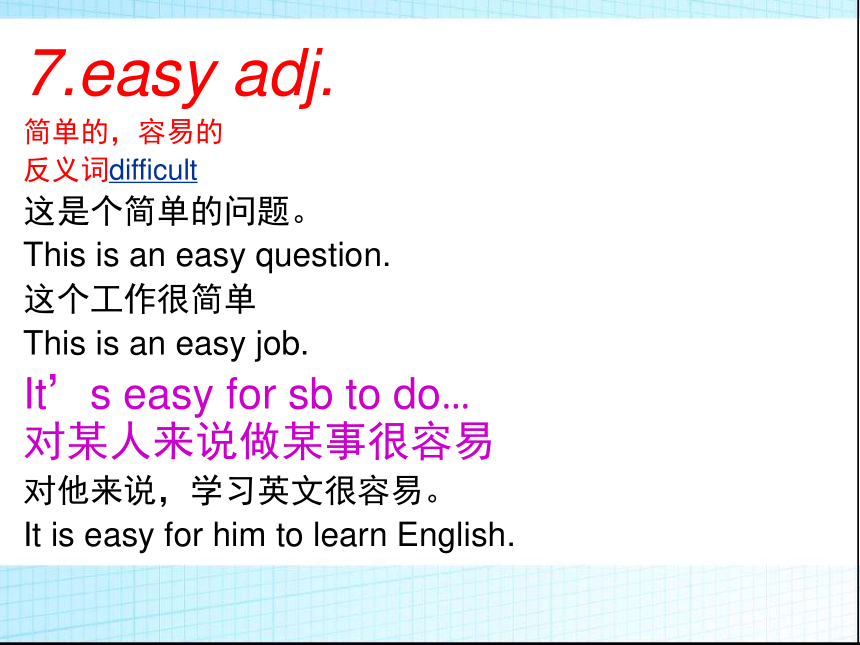
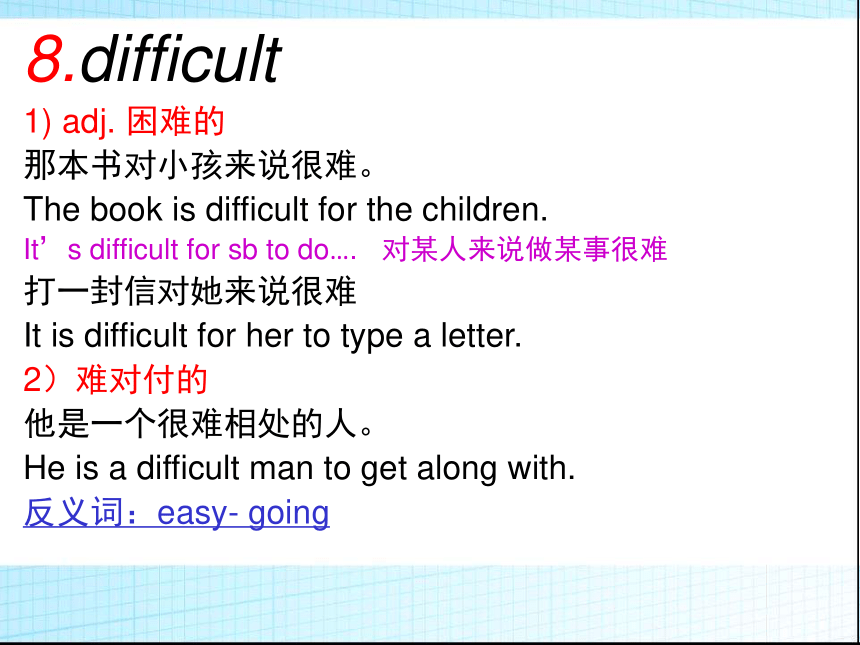
文档简介
(共58张PPT)
Lesson 103
The French test
喜怒哀乐四种表情
1. 当你听到暑假取消改为正常上课时。
You will feel very sad.
2.当你听到暑假,爸爸妈妈说带你去旅游。
You will be very excited.
Say what your feeling is
3.当你考试得了一百分时,你的爸爸妈妈表扬了你。
You will feel very happy.
4. 当你喜欢的笔记本找不到了。
You will be very angry or worried.
Topic:examination(exam)
How are you feeling after taking an exam
Are you happy or sad
Are you angry
Are you excited
Are you afraid
Are you worried with your mark
1.exam n. 考试 (examination 较为正式一些)
an entrance exam 入学考试
a final exam 期末考试
take an exam 参加考试
cheat in an exam 考试作弊
test (专项技能的)考试
driving test 驾照考试
a midterm exam 期中考试
考试不及格 考试通过
fail an exam pass an exam
2.pass
1) v. 及格,通过
只有十名学生通过了考试。
Only ten students passed the examination.
pass in +具体学科
pass in mathematics
pass in Chinese
2)把…递给…
pass sb sth= pass sth to sb
Please pass him the paper.
= Please pass the paper to him.
3.fail
1) v. 不及格(反义词pass)
fail the exam 考试不及格 fail in mathematics
2)v. 失败(反义词succeed)
计划失败了。
The plan failed.
fail to do … 未做成某事
我今天下午未能见到他。
I failed to see him this afternoon.
4.mathematics n. 数学
缩写是maths (math)
你数学好吗?
Are you good at mathematics
她数学不太好。
She is poor at mathematics.
我通过了数学考试。
I passed in mathematics .
5.question
1) n. 问题(反义词answer)
我能问你个问题吗?
May I ask you a question
最后两个问题 我回答不上来。
I can’t answer the last two questions.
6.answer
--1) v. 回答
他不想回答我。
He doesn’t want to answer me.
2)v. 应答,回应
请接电话。
Please answer the phone.
answer the door 应门
3) n. 答案
你知道这道题的答案吗
Do you know the answer to this question
7.easy adj.
简单的,容易的
反义词difficult
这是个简单的问题。
This is an easy question.
这个工作很简单
This is an easy job.
It’s easy for sb to do… 对某人来说做某事很容易
对他来说,学习英文很容易。
It is easy for him to learn English.
8.difficult
1) adj. 困难的
那本书对小孩来说很难。
The book is difficult for the children.
It’s difficult for sb to do…. 对某人来说做某事很难
打一封信对她来说很难
It is difficult for her to type a letter.
2)难对付的
他是一个很难相处的人。
He is a difficult man to get along with.
反义词:easy- going
9.enough
/i`n f/
1) adv. 足够地
你穿这么薄的衣服暖和么?
Are you warm enough in such a light coat
enough for sb to do 足够做….
这个房间我们住足够大了。
This room is big enough for us to live in .
你还太小,不能做这件事情。
You are not old enough to do it.
f
2)adj. 充足的
你有时间作这件事吗?
Do you have enough time to do it
你有足够的椅子给每个人吗?
Do you have enough chairs for everyone
十张纸足够了。
Ten pieces of paper are enough.
10.paper n.
1) n. 考卷(可数名词)
五十份考卷不够学生考试。
Fifty papers are not enough for the students to take the exam.
2)报纸(可数名词)相当于newspaper
a daily paper 日报
an evening paper 晚报
3)论文,报告(可数名词)
4)文件,资料(常用复数形式papers)
重要的文件
important papers
契约文件
contract papers
5) 纸(不可数名词)
一张纸
a piece of paper
three pieces of paper
11.mark
1) n. 分数
他在英语考试中得了高分
He got a high mark in English.
2) n. 记号,印,标记
make a mark 做记号
在船上上标上记号。
Please make a mark on the boat.
12.low adj.
1) 低的
小心,门很矮。
Be careful! It’s a low door.
我的成绩很低。
I’ve got a low mark.
2) (身体)弱的,没有精神的,意志消沉的
他因感冒而没精神。
He is low with a cold.
3) (声音) 低的
low season 淡季
high season 旺季
13.rest
1) n. 其他的东西,其它事
你可以把剩下的面包吃光。
You can eat up the rest of the bread.
你打开门和窗户,剩下的由我来做。
You open the door and window. I’ll do the rest.
2)n. 休息
休 息一下。
take a rest/have a rest
14.hate v. 讨厌
他们互相厌恶。
They hate each other.
hate doing…. 不喜欢做
她不喜欢做饭。
She hates cooking.
15.cheer v.
1) 振作,振奋
那个消息使那一家人振奋不己。
The news cheered the family.
提起精神,振作起来
Cheer up!
2)欢呼,喝彩,为(某人)加油
当他出现时群众发出欢呼声
The crowd cheered when he appeared.
16.top n. 上方,顶部
反义词bottom
在山顶
at the top of a mountain
书页的上方。
The top of the page .
from top to toe .= from top to bottom
从头到脚,完全的
On top of the world
非常幸福的,欢天喜地的
他高兴得心情飘飘然。
He felt on top of the world.
guy
家伙,人
fellow
*
New words
exam n. 考试
pass v. 及格,通过
mathematics n. (Maths是缩写)数学
question n. (具体的某一个)问题
easy adj. 容易的
enough adv. 足够的
paper n. 考卷
fail v. 未及格,失败
answer v. 问答
mark n. 分数
rest n. 其他的东西
difficult adj. 困难的
hate v. 讨厌
low adj. 低的
cheer v. 振作,振奋
guy n. 家伙,人
top n. 上方,顶部
The French test
1.How was Richard's exam
2. How long did the exam last
Not too bad.
Three hours
GARY: How was the exam, Richard
RICHARD: Not too bad. I think I passed in English and Mathematics.The questions were very easy. How about you, Gary
1、How was the exam
= How did the exam go
2、Not too bad.
Just so so. / Pretty good.
3、I think I passed in English and Mathematics.
pass 及格 不及格 fail
pass the mid-term exam
通过某一考试用pass, 而通过某一科目考试用pass in
4、How about you
= What about you
用于提建议:How about having a rest
GARY: The English and Maths papers weren't easy enough for me. I hope I haven't failed.
RICHARD: I think I failed the French paper.I could answer sixteen of the questions.They were very easy. But I couldn't answer the rest.They were too difficult for me.
5. The English and Maths papers weren't easy enough for me.
enough 足够地,副词,修饰形容词,用在形容词之后
easy enough
enough 足够的,形容词,修饰名词,用在名词之前
enough books/money
for 对…来说。
The house is big enough for us to live in.
6、I could answer sixteen of the questions.
could是can的过去式,后加动词原形,
否定形式couldn’t
7. sixteen of the questions 试题中的16道。
two of the students
8、They were too difficult for me.
difficult VS different
too ① 也;② 太,过于。
I like English , he likes English, too.
This pair of shoes are too small for me.
too...to... 太…而不能…
He is too young to go to school.
2、too VS very VS enough
副词
too 太 very 非常 enough 足够
(1)too和very通常放在所修饰的形容词之前,
而enough要放在所修饰的形容词之后:
The questions were too/very difficult.
The questions were easy enough.
(2)enough和too可以与介词to搭配使用,但意义不同:
The questions were easy enough (for me) to answer.
The questions were too difficult (for me) to answer.
GARY: French tests are
awful, aren't they
RICHARD: I hate them. I'm
sure I've got a
low mark.
9. hate like
10. get a low mark
get a high mark
GARY: Oh, cheer up! perhaps we didn't do too badly. The guy next to me wrote his name at the top of the paper.
RICHARD: Yes
GARY: Then he sat there and looked at it for three hours! He didn't write a word!
9. Cheer up!
Come on!open up!
10.The guy next to me wrote his name at the top of the paper.
next to = beside 在…旁边。
at the top of... 在…顶端,在…上方
at the bottom of...在…下方,在…末端
11. Then he sat there and looked at it for three hours!
For + 时间段:持续了多长时间。
I have lived here for ten years.
Lesson104
Too ,very, enough
Adjective(adj.)
Please describe the guy with adjectives
*
clever
cheap
fresh
low
low
hard
sweet
stupid
expensive
stale
loud
high
soft
sour
*
*
The fruits are fresh enough to eat.
The fruits are too stale to eat.
*
Q & A
1. What is one plus one
2. I can answer the question
because it is very easy.
*
clever
stupid
cheap
expensive
Could he answer all the questions
Yes, he could.
He was clever enough to answer them.
No. he couldn’t.
He was too stupid to answer them.
answer all the questions
buy the car
Could they hear the stereo
Yes, they could.
Because it was loud enough for them.
No, they couldn’t.
Because it was too low for them
hear to the stereo
loud
low
eat the orange
sweet
sour
Homework
1. 第103课单词每个写2遍,汉译1遍,并用103课单词各造一个句子。
2. 背诵第103课课文。
3. 预习第104课。
Exercise:A+B
Summary
1. 考试的相关词汇:
参加考试 take/have an exam
参加具体科目的考试,如英语考试,take an English (科目名称)exam
考试及格 pass the exam, pass in English(科目)exam。
考试不及格 fail the exam fail the English (科目) exam。
考试非常好 do well in the exam;
考试非常糟糕,do badly in the exam。
试卷,我们用paper这个词,这个时候,paper是可数名词了。比如英语和数学卷子 English and Maths papers.
2.考完试后的讨论:
你考得怎样? What about/How about you (in the exam)
对我来说不难 It`s easy enough for me to---( It's a piece of cake. 小菜一碟。)
对我来说很难 It's too difficult/hard for me to---
3. 振作语
Cheer up! 振作起来!
Hold yourself together!振作起来!
Come on!加油!
homework
1.听录音并跟读1-104,每天10分钟。
2.复习课文,句型,单词及单词运用。
3. 抄写不会的单词每个2遍,默会为止。
4. 做力所能及的事,准备期末考吧,家长签字评语——
Dear Grandma,
I have just arrived in Scotland and I'm staying at a Youth Hostel. I'll write a letter soon. I hope you
are all well.
Love,
Jimmy
祖母:请把吉米的明信片念给我听听,彭妮。
彭妮:“我刚到苏格兰,我现住在一家青年招待所。”
祖母:什么?
彭妮:他说他刚到苏格兰。
他说他住在一家青年招待所。
你知道,他是“青招协”的一个成员
祖母:什么?
彭妮:“青招协”,妈妈。青年招待所协会。
祖母:他还说了些什么?
彭妮:“我很快会写信的。
祝你们大家身体都好。”
祖母:什么?彭妮,大声一点。
我可听不见你念的。
彭妮:他说他很快会写信的。
他祝我们大家身体好。“谨此问候,吉米。”
祖母:就这些吗?他没写许多,是吗?
彭妮:在明信片上他写不了很多,妈妈。
引述别人的话有两种方式:
一是使用引号引出人家的原话,叫做直接引语;
一是用自己的话把人家的话转述出来,叫做间接引语。
例如: John says, “I‘m tired.”
(引号内是直接引语)
John says that he is tired.
(宾语从句是间接引语)
直接引语转换为间接引语
Gossip girl VS gossip boy
八卦他人
13、He doesn't say very much, does he
反意疑问句:
定义:表示提问人的看法,但没有把握,需要对方的证实。
结构:陈述句+简短疑问句。前肯后否,前否后肯。
两部分的人称和时态要保持一致。
You are Jimmy, aren’t you
They won’t leave, will they
回答时要根据事实,Yes/No也要与后面一致:
No, he doesn’t. 是,他没写多少。
Yes, he does. 不,他写了很多。
-
1. Tom does his homework every day,
2. He’s swimming now,
3. She doesn’t like maths,
4. They went to the beach yesterday,
5. They weren’t in Hangzhou last week,
6. He can speak a little French,
7. He can speak little French,
8. She never went to Shanghai,
9. Close the door,
10. Don’t be late,
11. Let us go out for a rest,
doesn’t he
isn’t he
does she
didn’t they
were they
can’t he
can he
did she
will you/won’t you
will you
will you
Lesson 103
The French test
喜怒哀乐四种表情
1. 当你听到暑假取消改为正常上课时。
You will feel very sad.
2.当你听到暑假,爸爸妈妈说带你去旅游。
You will be very excited.
Say what your feeling is
3.当你考试得了一百分时,你的爸爸妈妈表扬了你。
You will feel very happy.
4. 当你喜欢的笔记本找不到了。
You will be very angry or worried.
Topic:examination(exam)
How are you feeling after taking an exam
Are you happy or sad
Are you angry
Are you excited
Are you afraid
Are you worried with your mark
1.exam n. 考试 (examination 较为正式一些)
an entrance exam 入学考试
a final exam 期末考试
take an exam 参加考试
cheat in an exam 考试作弊
test (专项技能的)考试
driving test 驾照考试
a midterm exam 期中考试
考试不及格 考试通过
fail an exam pass an exam
2.pass
1) v. 及格,通过
只有十名学生通过了考试。
Only ten students passed the examination.
pass in +具体学科
pass in mathematics
pass in Chinese
2)把…递给…
pass sb sth= pass sth to sb
Please pass him the paper.
= Please pass the paper to him.
3.fail
1) v. 不及格(反义词pass)
fail the exam 考试不及格 fail in mathematics
2)v. 失败(反义词succeed)
计划失败了。
The plan failed.
fail to do … 未做成某事
我今天下午未能见到他。
I failed to see him this afternoon.
4.mathematics n. 数学
缩写是maths (math)
你数学好吗?
Are you good at mathematics
她数学不太好。
She is poor at mathematics.
我通过了数学考试。
I passed in mathematics .
5.question
1) n. 问题(反义词answer)
我能问你个问题吗?
May I ask you a question
最后两个问题 我回答不上来。
I can’t answer the last two questions.
6.answer
--1) v. 回答
他不想回答我。
He doesn’t want to answer me.
2)v. 应答,回应
请接电话。
Please answer the phone.
answer the door 应门
3) n. 答案
你知道这道题的答案吗
Do you know the answer to this question
7.easy adj.
简单的,容易的
反义词difficult
这是个简单的问题。
This is an easy question.
这个工作很简单
This is an easy job.
It’s easy for sb to do… 对某人来说做某事很容易
对他来说,学习英文很容易。
It is easy for him to learn English.
8.difficult
1) adj. 困难的
那本书对小孩来说很难。
The book is difficult for the children.
It’s difficult for sb to do…. 对某人来说做某事很难
打一封信对她来说很难
It is difficult for her to type a letter.
2)难对付的
他是一个很难相处的人。
He is a difficult man to get along with.
反义词:easy- going
9.enough
/i`n f/
1) adv. 足够地
你穿这么薄的衣服暖和么?
Are you warm enough in such a light coat
enough for sb to do 足够做….
这个房间我们住足够大了。
This room is big enough for us to live in .
你还太小,不能做这件事情。
You are not old enough to do it.
f
2)adj. 充足的
你有时间作这件事吗?
Do you have enough time to do it
你有足够的椅子给每个人吗?
Do you have enough chairs for everyone
十张纸足够了。
Ten pieces of paper are enough.
10.paper n.
1) n. 考卷(可数名词)
五十份考卷不够学生考试。
Fifty papers are not enough for the students to take the exam.
2)报纸(可数名词)相当于newspaper
a daily paper 日报
an evening paper 晚报
3)论文,报告(可数名词)
4)文件,资料(常用复数形式papers)
重要的文件
important papers
契约文件
contract papers
5) 纸(不可数名词)
一张纸
a piece of paper
three pieces of paper
11.mark
1) n. 分数
他在英语考试中得了高分
He got a high mark in English.
2) n. 记号,印,标记
make a mark 做记号
在船上上标上记号。
Please make a mark on the boat.
12.low adj.
1) 低的
小心,门很矮。
Be careful! It’s a low door.
我的成绩很低。
I’ve got a low mark.
2) (身体)弱的,没有精神的,意志消沉的
他因感冒而没精神。
He is low with a cold.
3) (声音) 低的
low season 淡季
high season 旺季
13.rest
1) n. 其他的东西,其它事
你可以把剩下的面包吃光。
You can eat up the rest of the bread.
你打开门和窗户,剩下的由我来做。
You open the door and window. I’ll do the rest.
2)n. 休息
休 息一下。
take a rest/have a rest
14.hate v. 讨厌
他们互相厌恶。
They hate each other.
hate doing…. 不喜欢做
她不喜欢做饭。
She hates cooking.
15.cheer v.
1) 振作,振奋
那个消息使那一家人振奋不己。
The news cheered the family.
提起精神,振作起来
Cheer up!
2)欢呼,喝彩,为(某人)加油
当他出现时群众发出欢呼声
The crowd cheered when he appeared.
16.top n. 上方,顶部
反义词bottom
在山顶
at the top of a mountain
书页的上方。
The top of the page .
from top to toe .= from top to bottom
从头到脚,完全的
On top of the world
非常幸福的,欢天喜地的
他高兴得心情飘飘然。
He felt on top of the world.
guy
家伙,人
fellow
*
New words
exam n. 考试
pass v. 及格,通过
mathematics n. (Maths是缩写)数学
question n. (具体的某一个)问题
easy adj. 容易的
enough adv. 足够的
paper n. 考卷
fail v. 未及格,失败
answer v. 问答
mark n. 分数
rest n. 其他的东西
difficult adj. 困难的
hate v. 讨厌
low adj. 低的
cheer v. 振作,振奋
guy n. 家伙,人
top n. 上方,顶部
The French test
1.How was Richard's exam
2. How long did the exam last
Not too bad.
Three hours
GARY: How was the exam, Richard
RICHARD: Not too bad. I think I passed in English and Mathematics.The questions were very easy. How about you, Gary
1、How was the exam
= How did the exam go
2、Not too bad.
Just so so. / Pretty good.
3、I think I passed in English and Mathematics.
pass 及格 不及格 fail
pass the mid-term exam
通过某一考试用pass, 而通过某一科目考试用pass in
4、How about you
= What about you
用于提建议:How about having a rest
GARY: The English and Maths papers weren't easy enough for me. I hope I haven't failed.
RICHARD: I think I failed the French paper.I could answer sixteen of the questions.They were very easy. But I couldn't answer the rest.They were too difficult for me.
5. The English and Maths papers weren't easy enough for me.
enough 足够地,副词,修饰形容词,用在形容词之后
easy enough
enough 足够的,形容词,修饰名词,用在名词之前
enough books/money
for 对…来说。
The house is big enough for us to live in.
6、I could answer sixteen of the questions.
could是can的过去式,后加动词原形,
否定形式couldn’t
7. sixteen of the questions 试题中的16道。
two of the students
8、They were too difficult for me.
difficult VS different
too ① 也;② 太,过于。
I like English , he likes English, too.
This pair of shoes are too small for me.
too...to... 太…而不能…
He is too young to go to school.
2、too VS very VS enough
副词
too 太 very 非常 enough 足够
(1)too和very通常放在所修饰的形容词之前,
而enough要放在所修饰的形容词之后:
The questions were too/very difficult.
The questions were easy enough.
(2)enough和too可以与介词to搭配使用,但意义不同:
The questions were easy enough (for me) to answer.
The questions were too difficult (for me) to answer.
GARY: French tests are
awful, aren't they
RICHARD: I hate them. I'm
sure I've got a
low mark.
9. hate like
10. get a low mark
get a high mark
GARY: Oh, cheer up! perhaps we didn't do too badly. The guy next to me wrote his name at the top of the paper.
RICHARD: Yes
GARY: Then he sat there and looked at it for three hours! He didn't write a word!
9. Cheer up!
Come on!open up!
10.The guy next to me wrote his name at the top of the paper.
next to = beside 在…旁边。
at the top of... 在…顶端,在…上方
at the bottom of...在…下方,在…末端
11. Then he sat there and looked at it for three hours!
For + 时间段:持续了多长时间。
I have lived here for ten years.
Lesson104
Too ,very, enough
Adjective(adj.)
Please describe the guy with adjectives
*
clever
cheap
fresh
low
low
hard
sweet
stupid
expensive
stale
loud
high
soft
sour
*
*
The fruits are fresh enough to eat.
The fruits are too stale to eat.
*
Q & A
1. What is one plus one
2. I can answer the question
because it is very easy.
*
clever
stupid
cheap
expensive
Could he answer all the questions
Yes, he could.
He was clever enough to answer them.
No. he couldn’t.
He was too stupid to answer them.
answer all the questions
buy the car
Could they hear the stereo
Yes, they could.
Because it was loud enough for them.
No, they couldn’t.
Because it was too low for them
hear to the stereo
loud
low
eat the orange
sweet
sour
Homework
1. 第103课单词每个写2遍,汉译1遍,并用103课单词各造一个句子。
2. 背诵第103课课文。
3. 预习第104课。
Exercise:A+B
Summary
1. 考试的相关词汇:
参加考试 take/have an exam
参加具体科目的考试,如英语考试,take an English (科目名称)exam
考试及格 pass the exam, pass in English(科目)exam。
考试不及格 fail the exam fail the English (科目) exam。
考试非常好 do well in the exam;
考试非常糟糕,do badly in the exam。
试卷,我们用paper这个词,这个时候,paper是可数名词了。比如英语和数学卷子 English and Maths papers.
2.考完试后的讨论:
你考得怎样? What about/How about you (in the exam)
对我来说不难 It`s easy enough for me to---( It's a piece of cake. 小菜一碟。)
对我来说很难 It's too difficult/hard for me to---
3. 振作语
Cheer up! 振作起来!
Hold yourself together!振作起来!
Come on!加油!
homework
1.听录音并跟读1-104,每天10分钟。
2.复习课文,句型,单词及单词运用。
3. 抄写不会的单词每个2遍,默会为止。
4. 做力所能及的事,准备期末考吧,家长签字评语——
Dear Grandma,
I have just arrived in Scotland and I'm staying at a Youth Hostel. I'll write a letter soon. I hope you
are all well.
Love,
Jimmy
祖母:请把吉米的明信片念给我听听,彭妮。
彭妮:“我刚到苏格兰,我现住在一家青年招待所。”
祖母:什么?
彭妮:他说他刚到苏格兰。
他说他住在一家青年招待所。
你知道,他是“青招协”的一个成员
祖母:什么?
彭妮:“青招协”,妈妈。青年招待所协会。
祖母:他还说了些什么?
彭妮:“我很快会写信的。
祝你们大家身体都好。”
祖母:什么?彭妮,大声一点。
我可听不见你念的。
彭妮:他说他很快会写信的。
他祝我们大家身体好。“谨此问候,吉米。”
祖母:就这些吗?他没写许多,是吗?
彭妮:在明信片上他写不了很多,妈妈。
引述别人的话有两种方式:
一是使用引号引出人家的原话,叫做直接引语;
一是用自己的话把人家的话转述出来,叫做间接引语。
例如: John says, “I‘m tired.”
(引号内是直接引语)
John says that he is tired.
(宾语从句是间接引语)
直接引语转换为间接引语
Gossip girl VS gossip boy
八卦他人
13、He doesn't say very much, does he
反意疑问句:
定义:表示提问人的看法,但没有把握,需要对方的证实。
结构:陈述句+简短疑问句。前肯后否,前否后肯。
两部分的人称和时态要保持一致。
You are Jimmy, aren’t you
They won’t leave, will they
回答时要根据事实,Yes/No也要与后面一致:
No, he doesn’t. 是,他没写多少。
Yes, he does. 不,他写了很多。
-
1. Tom does his homework every day,
2. He’s swimming now,
3. She doesn’t like maths,
4. They went to the beach yesterday,
5. They weren’t in Hangzhou last week,
6. He can speak a little French,
7. He can speak little French,
8. She never went to Shanghai,
9. Close the door,
10. Don’t be late,
11. Let us go out for a rest,
doesn’t he
isn’t he
does she
didn’t they
were they
can’t he
can he
did she
will you/won’t you
will you
will you
同课章节目录
